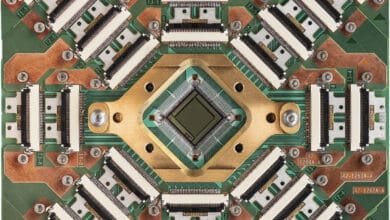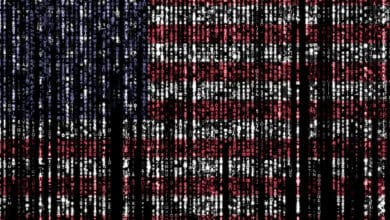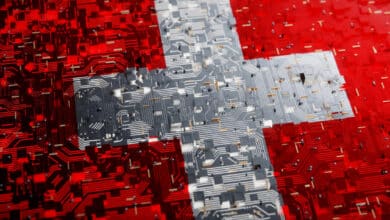Quantum Computing
PostQuantum.com by Marin Ivezic – Quantum Computing, Quantum Technologies, Post-Quantum
-

Quantum Computing Benchmarks: RCS, QV, AQ, and More
As quantum computing hardware rapidly improves, simple metrics like qubit count are no longer sufficient to gauge a system’s true capability. Unlike classical computers where transistor counts roughly correlate with performance, quantum bits (qubits) can be error-prone and short-lived, so a few high-fidelity qubits can be more valuable than many…
Read More » -

Adiabatic Quantum (AQC) and Cyber (2024 Update)
Adiabatic Quantum Computing (AQC) is an alternative paradigm that uses an analog process based on the quantum adiabatic theorem. Instead of discrete gate operations, AQC involves slowly evolving a quantum system’s Hamiltonian such that it remains in its lowest-energy (ground) state, effectively “computing” the solution as the system’s final state.…
Read More » -

Quantum Technology Initiatives in Europe and EU
Europe’s quantum technology landscape has evolved from disparate academic projects into a coordinated multi-billion euro endeavor encompassing the EU and its member states. The historical commitment to quantum science is now manifesting in tangible outputs: prototype quantum computers in laboratories and supercomputing centers, quantum-secure communication testbeds linking cities, and quantum…
Read More » -

Quantum Hacking: Cybersecurity of Quantum Systems
While these machines are not yet widespread, it is never too early to consider their cybersecurity. As quantum computing moves into cloud platforms and multi-user environments, attackers will undoubtedly seek ways to exploit them.
Read More » -
The Quantum Approximate Optimization Algorithm (QAOA) – A Beginner’s Guide
At its core, QAOA is a hybrid quantum-classical algorithm that constructs a special kind of quantum circuit (or “ansatz”) to represent a candidate solution, and then uses a classical optimizer to tweak that circuit for better results. It was introduced in 2014 by Edward Farhi and collaborators as an algorithm…
Read More » -
Australia Quantum Computing & Quantum Technology
Australia’s quantum technology journey has progressed from pioneering academic experiments to a coordinated national endeavor spanning government, academia, and industry. The country has built a solid foundation with landmark research in quantum computing (particularly in silicon qubit hardware and error correction) and has extended its expertise to quantum communications and…
Read More » -
Quantum Technology Use Cases in Aerospace & Automotive
Quantum computing is on the verge of reshaping the future of both aerospace and automotive sectors, even if the technology’s full maturation is still years away. In this article, we’ve seen that current developments – from corporate partnerships and research alliances to early quantum prototypes tackling real use cases –…
Read More » -
Quantum Technology Use Cases in Finance & Banking
Quantum computing is no longer just a physics lab curiosity; it’s emerging as a strategic frontier for the Finance and Banking sector. Quantum technologies hold the potential to transform financial services – improving risk management, turbocharging trading and analytics, enhancing cybersecurity, and even forcing a paradigm shift in how data…
Read More » -
Quantum Technology Use Cases in Government & Defense
Quantum computing is on the cusp of reshaping government and defense, much as radar or the internet did in earlier eras. It promises enhancements across the board – unbreakable communications, unprecedented computing power for logistics and AI, new sensors that reveal hidden threats, and simulations that accelerate innovation. It also…
Read More » -
Quantum Computing & Quantum Technology Initiatives in the USA
The United States has entered a new phase of quantum technology development – one marked by large-scale engineering challenges and system integration, rather than just laboratory science. The next decade will be critical. If current trends hold, we will witness U.S. quantum computers tackling problems that were impossible before, quantum…
Read More » -
Quantum Computing & Quantum Technology Initiatives in Canada
Canada has established itself as a major hub of quantum technology research, and its recent initiatives aim to translate that strength into societal and economic benefits. The country’s National Quantum Strategy, with its coordinated missions in computing, communications, and sensing, provides a roadmap for the next stage of quantum innovation…
Read More » -
Quantum Computing Use Cases in Materials & Chemicals
Quantum computing and associated quantum technologies are on the cusp of ushering in a new era for materials science and chemical engineering. After decades of development, the vision is becoming reality. Quantum computers – though still nascent – have already shown they can emulate the quantum behavior of molecules and…
Read More » -
Quantum Technologies and Quantum Computing in Switzerland
Switzerland’s quantum technology ecosystem exemplifies how a combination of academic excellence, proactive government support, and innovative entrepreneurship can make a country a major player in the second quantum revolution. In the span of two decades, Switzerland has built a world-class quantum R&D environment – featuring top universities (ETH, EPFL, Geneva,…
Read More » -
Quantum Technologies & Quantum Computing in the UK
The United Kingdom’s quantum technology initiatives have moved from foundational research into a phase of delivery and implementation. The country’s comprehensive approach – supporting research excellence, investing in infrastructure and industry collaboration, and aligning with national goals in security and economy – provides a strong platform for future success. Over…
Read More » -
India’s Quantum Computing and Quantum Technology Initiatives
India’s quantum technology initiatives, though starting later than some global peers, are rapidly gaining traction. The nation is combining its rich legacy in fundamental physics with modern innovation frameworks to advance quantum computing, communications, cryptography, and sensing. The coming years are poised to witness India transitioning from prototyping to implementation:…
Read More »










